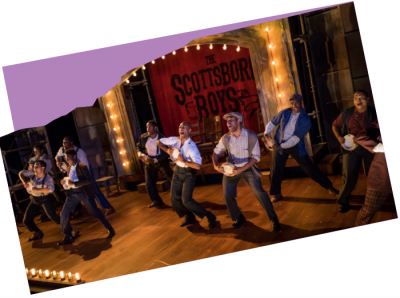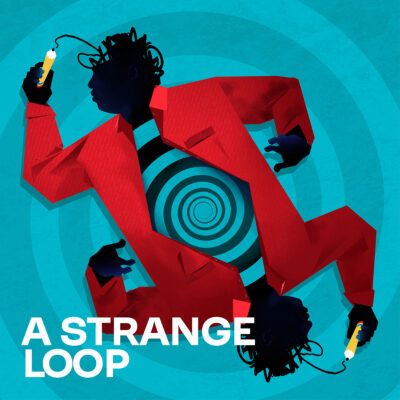Your donation sets the stage for a new season of Boston's most intimate, entertaining and provocative plays and musicals. Our shows make powerful connections with our audiences-- and they are only possible because of you.
Interview with the Playwright
Interview with the Playwright
An Interview with Stephen Adly Guirgis
 Playwright Stephen Adly Guirgis has been a member of LAByrinth Theater Company, a New York City ensemble theatre, from its 1992 inception. Since 2009, he has also been its coartistic director. His best know earlier plays, Jesus Hopped the ‘A’ Train, Our Lady of 121 st Street and The Last Days of Judas Iscariot, were all produced by LAByrinth and directed by fellow member Philip Seymour Hoffman. The 2011 production of his latest play, The Motherf**ker With the Hat, received six Tony nominations including one for Best Play. It was produced on Broadway by Scott Rudin, The Public Theatre and LAByrinth.
Playwright Stephen Adly Guirgis has been a member of LAByrinth Theater Company, a New York City ensemble theatre, from its 1992 inception. Since 2009, he has also been its coartistic director. His best know earlier plays, Jesus Hopped the ‘A’ Train, Our Lady of 121 st Street and The Last Days of Judas Iscariot, were all produced by LAByrinth and directed by fellow member Philip Seymour Hoffman. The 2011 production of his latest play, The Motherf**ker With the Hat, received six Tony nominations including one for Best Play. It was produced on Broadway by Scott Rudin, The Public Theatre and LAByrinth.
Growing up on New York’s Upper West Side, were you exposed to theatre?
We didn’t have a lot of money, so my mom would take us to the theatre once every couple of years for a special occasion. But she took us to the movies all the time. There was an old revival house in our neighborhood that used to show double features. She always talked a lot about theatre and performing, so I think that’s how it got into my blood.
How did you end up a theatre major in college?
I did some plays in high school and thought I really wanted to be in the theatre, but at the time I didn’t think you could major in theatre. I didn’t think it made any sense. I kept switching my major [at State University of New York in Albany] always taking theatre classes on the side. Finally, I realized: If I’m ever going to graduate, the most credits I have is in theatre; and it’s what I want to do anyway; so why don’t I just become a theatre major?
Was your first intention to become an actor or had you always wanted to write?
No, my first intention was to be an actor—and I’m still an actor. I just kind of fell into writing along the way.
Did you write your first plays for LAByrinth?
When we first started we were just a “gym for actors.” But over the course of a year of two, we bonded together really strongly and decided that we wanted to produce work. Nobody at the time knew who we were, so it was hard. We’d find a play we wanted to do, but the playwright maybe wouldn’t want to give it to us. Or we’d find a play, but then when we found a director, he’d say, “Well, I don’t know if I can cast it within the company.” So pretty quickly we made a decision to do it all within the company. At some point, we did an evening of little one-acts and they asked me to write one. And I guess it went well, so they kept pressuring me to keep writing.
When you were first writing plays, how did you balance writing with supporting yourself?
I worked in restaurants for twenty years—everything you can do in a restaurant. Eventually, I started doing arts education, which was a lot more fulfilling. I was always working day jobs up until Jesus Hopped the ‘A’ Train.
Was that when Philip Seymour Hoffman helped you out?
Yeah. We were going into rehearsals in a couple of weeks and I was still writing the play. I told him, “I don’t know if I can finish the play. I don’t have time. I can’t pay the rent, blah, blah, blah…” And he asked me how much money would it take to get by for a few months? I told him and he gave me the money. I was like, “No, no, no.” But he was, “Nah, you know, take the money and write the play. And then, you know—‘cause I have a feeling after this you’re not going to have to worry so much about day jobs—and then some day in the future maybe you’ll do the same thing for someone else.” Which I did.
What does it take to get you going on a play?
Well, usually what gets me started writing is something that I’m feeling—something that’s going on inside of me that I either can’t articulate or can’t understand. There’s things you can’t share with your friends or your therapist or whatever. It’s usually like that. Something that’s been going on inside of me that just launches me to want to write. Then some dialogue will emerge and trying to get the feelings on the paper in the form of dialogue often times will launch the beginnings of a play. Then I keep going back at it and working on it.
What was the genesis or trigger for The Motherf**ker with the Hat?
When I started to write the play, I was responding to a lot of things that were going on in my life. I think the primary engine of the play is something that’s probably a recurring theme in my work: a main character past the age where they should have already grown up and matured emotionally but they’re still trying to do that. I was experiencing how the world can be different as an adult than it was as a child. When we’re young we form close friendships with people of the same sex—guys have guy friends and girls have their girl friends—and there’s a sense of loyalty that is part of that friendship. Then, when we get older, a million other things influence us and sometimes those values are lost.
And then the aspect of the play that deals with 12 Steps is reflecting on my observation—and I think the observation of others, too—that those programs, in and of themselves, are perfect. They work. They save lives and enhance lives. The program is perfect, but the people inside the program are not perfect. They’re often a work in progress. Nobody comes into those rooms because they’re so well adjusted. It’s obviously not true of everyone, but a lot of people in recovery saw the play and the overwhelming majority were like, “Yup.” It’s just reality—people behaving badly, struggling with their own moral compass.
LAByrinth has announced a new play from you for next summer but there’s no title and no details given. So, where are you at with this play?
Early! That’s why there are no details. I’m writing it now and it’s really early on.
Does having a deadline like that work as a motivator for you?
It’s definitely a motivator. Whether it’s the best way to go about doing it—maybe, maybe not. Maybe not. Oftentimes it’s been the way that I work. The page count is very low at this point. I think in this case they really wanted a play from me and so I thought to myself, “Why not do one for the company?”
-Suzanne Bixby
 Join us for spectacular season 33!
Join us for spectacular season 33! Past Productions
Past Productions a strange loop
a strange loop




